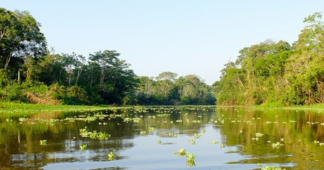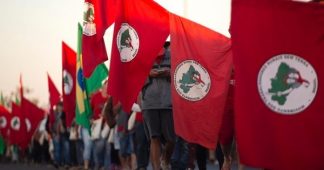By Marcos Colón
28 Oct. 2018
2018 is a symbolic year for the Amazon Rainforest. A ghost prowls the region. It is embodied in the expectation of presidential candidate, Jair Messias Bolsonaro, being elected President of Brazil. The Amazon is both one of the first and last utopias on planet Earth. Even before the discovery of the New World, the figure of a lost, remote land, a locus of both rest and restlessness, was being drawn in the social imagination in fantastic themes and episodes.
The ignorance of the current presidential candidate, in regard to the region, shows the clear poverty of the economic and political ideas with which he intends to guide his possible mandate. The Amazon is a special part of Brazil whose integration between forest and hydrography, as well as sociocultural and historical diversity, presents problems and solutions for the country and the world. For Bolsonaro, the Amazon is just an undeveloped, remote side of Brazil, which, in his discourse, only counts as “a place of [ignorant] Indians, Quilombolas and Caboclos”. It is a place which should give way to progress through chopping down the forest for the advance of agribusiness open to foreign investors. This perspective ignores millennia of adaptability of people and nations recognized by multilateral organizations on the side of solidarity around the world. He ignores scientific thought on the region. He ignores the resistance and resilience of the Humid Tropical cultures. He ignores that the Amazon Rainforest consists of nine countries – Brazil, Venezuela, Colombia, Peru, Bolivia, Equador, Surinam, Guyana and French Guyana.
In confirming that the “Amazon is not ours”, and defending opening up the region to exploration, candidate Bolsonaro steps on land he knows only in generalities. “It [The Amazon] is vital for the world”, he has stated. “The Amazon is not ours and it is with great sadness that I say this, but it is a reality and we have ways to explore this region in partnership”.
At a meeting with executives, Bolsonaro indicated that he was favorable towards exploration of the riches of the Amazon. According to estimates presented at the meeting, the natural resources in the region – including minerals and oil, among others – are valued at up to US$ 5 trillion. Executives participating in the event confirmed receptiveness to “putting the Amazon back on the agenda”. This can only mean the agenda of visible predatory interests.
Economic exploration of the Amazon in the form proposed by the candidate faces plenty of resistance from certain sections of society. Last year, the government of current president Michel Temer tried to open up Renca (an area in the Amazon conceived by the military government for exploration of mineral resources and which until now has not received legal exploration), but gave up on the idea after negative repercussions.
Bolsonaro, who in various areas demonstrates a similar discourse to the president of the United States, Donald Trump (who withdrew the USA from the Global Climate Agreement), has confirmed being against the agreement because Brazil would have to “pay a high price” to meet its demands. According to Bolsonaro, the agreement injures the sovereignty of the country.
“What is in play is national sovereignty, because there are 136 million hectares that we’ve lost control of”, said Bolsonaro to journalists. In the same interview he added: “I will leave the Paris Agreement if this continues being an object of it. If our part means handing over 136 million hectares of the Amazon, then I’m out”.
The Paris Agreement was approved by 195 countries in 2015 and one of its principal aims is to reduce the emission of greenhouse gases, so as to avoid global warming. In June of this year, the USA abandoned the agreement through the decision of President Trump, who had been committed to withdrawing the country from the international pact during his presidential campaign.
Bolsonaro, if elected, will take to the Congress a debate on the demarcation of Indian lands and on authorization for the titularisation of the lands and commercial exploration of protected areas currently occupied by Indians and Quilombolas. This would have implications for the sustainable use of land by riparian and indigenous agriculture in the Amazon, besides threatening the life styles of their native populations, the most unprotected in Brazil.
“There are a lot of oversized reserves and the Indians want to do on the land what the farmers do on their lands. We want to titularise indigenous and Quilombola areas as well, if it depends on me; of course it (the approval for commercial exploration in these areas) will have to get through Parliament”.
It is on this aspect in particular that the environmental fascism, which is embraced by Bolsonaro as President, threatens the Amazonian lands and people. Historical examples of fascism (Mussolini and Hitler) are considered anti-democratic as the relationship between State and Society neither respects social mediations, nor admits divergence or debate. Protest, opinion and the active participation of civil society are ignored, while power and choice are concentrated in the hands of the few, without the right to contradiction and the elimination of public opinion and free press. Given this characterization, how would the environmental fascism being perceived in Bolsonaro be defined?
It would first be defined by the defense of predatory use of natural resources in economic activity, and, moreover, by the inadmissibility of external opinion (community councils, academia, NGOs) on the fate of these resources, which would be under the exclusive responsibility of national government. Such inadmissibility could also be reinforced by law through the intervention to extinguish the forces of activism, especially with the repulsion of rural social movements.
Then there is the declared intervention restricting the use of land by minorities or groups in traditional possession of the land – whose practices limit the model of predatory development – whereby economic zoning is imposed on the ecosystems and biomes, increasing environmental impact and the chances of an environmental catastrophe. The entire regulatory framework of restrictions on the exploitation of natural environments would be minimized or made extinct under the fascist rhetoric.
There is a risk of a “de-legitimization” of scientific advances concerning the integration of planetary laws of physics with natural, cultural and historical phenomena, as such knowledge weakens the idea of national sovereignty over such territories, which would be impossible for the monolithic, omnipotent state.
The natural, cultural and historical heritage of humanity protected by science would be subject to a different perspective, devalued and discredited before national interests. Such national interests, imposed on divergent ideas, operate within the fascist logic excluding other meanings and visions of a possible world.
Statements made by Bolsonaro show little consistency or diplomatic content demonstrate that the candidate has already given up the sovereign right and duty of the Brazilian State and society guaranteeing the presence of Brazil in the future of the region.
This goes against the Brazilian Constitution, which, in article 255, § 4º, establishes the fundamental regulatory mark for the country:
“Art. 225. Everyone has the right to an ecologically balanced environment, as well as to common use of the people and usage essential to healthy quality of life, imposing on the public and collective power the duty to defend it and preserve it for present and future generations.
- 4º The Brazilian Amazon Rainforest, the Atlantic Forest, the Serra do Mar, the Mato-Grossense Pantanal and the Coastal Zone are national heritage, and their usage shall, in accordance with the law, be within conditions guaranteeing preservation of the environment, including in regard to the use of natural resources.”
Bolsonaro’s lack of knowledge on Brazil is a profound threat to Brazilians in the Amazon Basin, which is simultaneously Brazilian and continental. Giving up the Amazon to the world’s interests of predatory exploration has already been considered by the military dictatorship and other governments as payment for Brazil’s external debt. It was the Brazilian and continental Amazonian populations, alongside the scientific community and informed national institutions, who denounced this false discourse of national salvation and fought for the integrity of the land and its resources for contemporary generations.
However, the Amazon is a part of the complex contemporary world in its physical, environmental, socio-cultural and historical components. As a biome, an ecosystem, contemporary states and societies, it can be synthesized as follows:
– The Amazon is a complex of interconnected ecosystems, which, as a system of life, are influential in the maintenance of the Earth’s equilibrium. The development of nature sciences and interdisciplinarity of fields and areas of knowledge enables the region to be considered as a decisive entity in the chemical maintenance and transformation of the atmosphere, in the dynamic of the hydrological cycle and in climate change;
– The Amazonian ecosystems have the highest biodiversity in the world. However, all its species are not yet scientifically known, and despite still being unique in their natural environment, they are mostly in a fragile situation or in the process of extinction. The threat to the Amazon’s natural resources originates from, on the one hand, the lack of scientific knowledge on its internal workings, which interferes in the management of its flora, fauna and native populations, and from external influences of natural planetary, physical-chemical and biological processes on its local, temporary and permanent impacts. On the other hand, the inadequate management of the Amazon’s known and potential riches competes in the damage to Amazonian ecosystems.
– The Amazon constitutes a complex region, with ongoing economic processes of worldwide significance, composed of urban, rural and indigenous areas and populations of ancient occupation, and of environmentally protected reserves of both traditional and recent management. There is a pressing necessity for the Amazon to be developed through the free exercise of economic usage of its natural resources, disciplined and conditioned by actions of socio-economic development based on the institutional order of its States.
In his emblematic speech on national television, after the result of the first round of voting, Bolsonaro declared, “We want an end to this industry of fines practiced by the Brazilian Institute for the Environment and Natural Resources (IBAMA) and the Chico Mendes Institute for Conservation and Biodiversity (ICMBio) together on the fields. We are going to put a full stop on all activism in Brazil”. He did not speak for the landless, the leaseholders or small producers; he clearly assumed, in this case, a commitment to the agricultural capital of the country.
Bolsonaro once again demonstrates not only his ignorance, but also his disrespect for the true value of the Amazon and its importance in the lives of its indigenous people and in the lives of ordinary Brazilians. What he fails to understand is that millions of Brazilians defend the Amazon as a place where the relationship between nature and culture is emblematic in its representation of the Brazil we want, not of the Brazil being preached by Bolsonaro — the predator. Because the conquest of the Amazon of Brazil and other South-American countries is not derived only from the reproduction of colonialism, it also arises from the political struggle of its peoples.
Brazilians from North to South, traditional populations, Indians, Quilombolas, Pantaneiros, Riparians, Caboclos and other denominations of indigenous Amazonians as people of the forest have already constructed a consensus, which is that national protection of Amazonian nature is as important as public policies like Fome Zero (Zero Hunger) and Bolsa Família (Family Allowance). The six Brazilian biomes of the Amazon, Cerrado (savanna), Caatinga, Atlantic Forest, Pantanal wetlands and Pampa plains are niches of human adaptability alongside cities, communities, metropolises and municipalities. Moreover, it should be remembered that candidate Bolsonaro won in 2800 of the 5,570 Brazilian municipalities, as opposed to Fernando Haddad, his opponent, who won in 2600 municipalities of provincial Brazil. His victory occurred predominantly in the capital cities (with the exception of the North-East). In this context, fake news and social networks operate as a supplementary political force, reinforcing obscurantism and fundamentalism of racial ideologies, prejudices of every order and ignorance on the sustainability of environmental protection policies in the Amazon.
Upon stating that he will finish with state institutions (IBAMA and ICMbio) looking after the environment and with all political activism, Bolsonaro is effectively ripping up the Brazilian Constitution of 1988, which any presidential candidate is duty bound to protect. Bolsonaro in the Amazon is a reminder of old and new ghosts, evoking an episode from the book O Dezoito Brumário de Luiz Bonaparte, in which the nephew imitates the uncle, first in tragedy and then in farce. Bolsonaro in the Amazon will also be a tragedy for Brazil, under a farce of a democracy. Candidate Bolsonaro shows himself to be deprived even of authenticity. In taking Donald Trump as a role model, he is merely incorporating and piloting another historical farce, which will consequently be a tragedy for the Brazilian people of the Amazon.
* Marcos Colón, Teaching Assistant (TA) at Department of Spanish and Portuguese, and Graduate Associate at Center for Culture, History and Environment (CHE) of the Nelson Institute for Environmental Studies from the University of Wisconsin-Madison; he is also the director and producer of Beyond Fordlândia: An Environmental Account of Henry Ford’s Adventure in the Amazon.
Published at https://blogs.mediapart.fr/edition/les-invites-de-mediapart/article/281018/environmental-fascism-haunting-amazon











